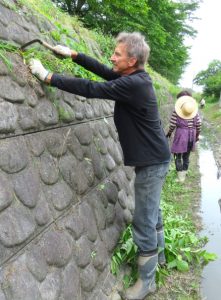 What were you doing on Sunday morning?
What were you doing on Sunday morning?
I can tell you what I was doing. I was enjoying what I consider to be one of the most charming aspects of living where I do in Japan.
Sasayama is a tiny, traditional, rural city that sprawls over a large area, having absorbed five other towns into it many years ago. There are about 50,000 people living within the city limits.
But Sasayama is split into a number of small villages. Ours is called Noma. Each village has its own shrine — ours honors Benten, the goddess of arts, literature, music, and dance, quite appropriate for my wife and I — its own community center — exactly what it sounds like, a center for holding a variety of community meetings, get-togethers, barbecues, and so on — its own sports team for the annual sports day competitions with other villages — a funny and endearing event which deserves its own separate article.
During good weather, meaning only excepting the brutal winter months, the village gets together once or twice a month to . . . are you ready? . . . clean up the neighborhood!
Actually, since folks here rarely litter, going around to pick up gum wrappers and empty soda cans is kind of a pointless task. So usually we do other much more useful things, like tend to the vast system of irrigation ditches and channels, cut weeds, clear excess bamboo and other unwanted wild growth.
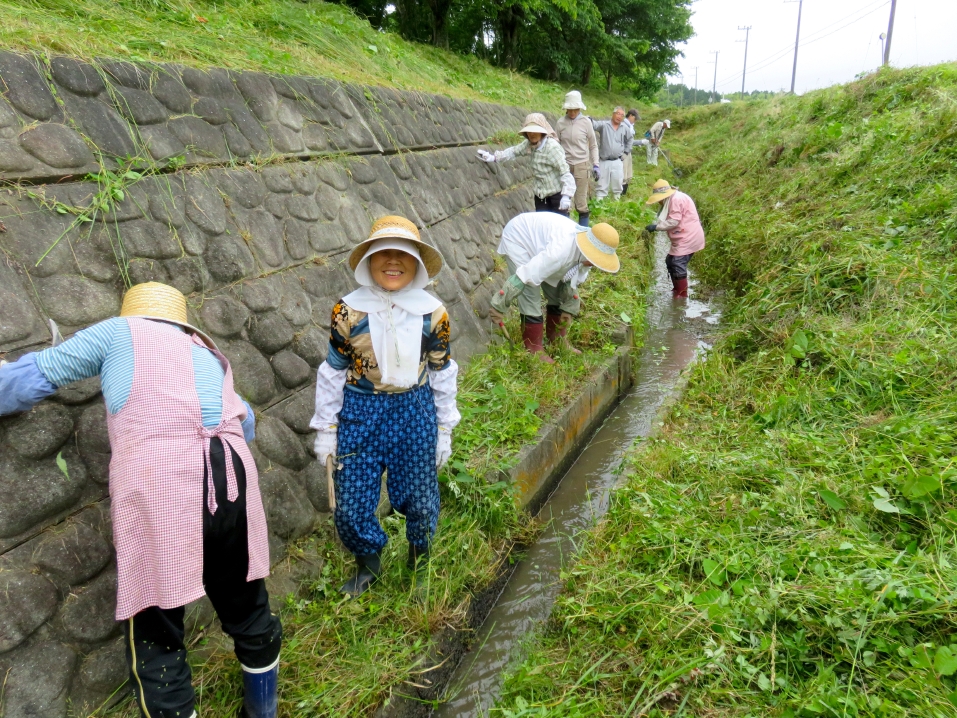
Today’s job was working on a wall which always sprouts all sorts of destructive weeds and shrubs. While men with weed-whackers cleared the undergrowth from the surrounding area, the rest of us hacked away at what was growing on the wall. Note that we don’t take the easy way out — using carcinogenic Roundup — but just do it by hand. Chop chop!
Our work sessions last from 3 to 4 hours. After nearly two hours, we take a short break. The village provides rolls and tea, and we just lounge about and talk, resting up for the final assault on the day’s project.
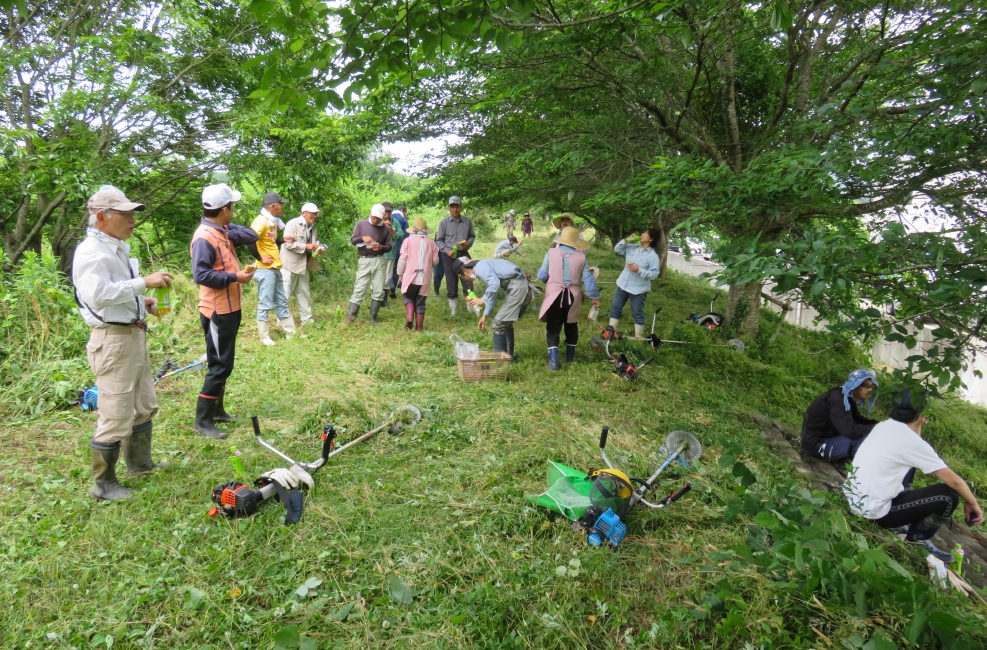
After cleaning up the wall, everyone returned to the community center, potted flowers for beautifying the neighborhood — they are placed all along the major paths and lanes which wind through our village — and were given flowers and potting soil to take home for our own personal use.
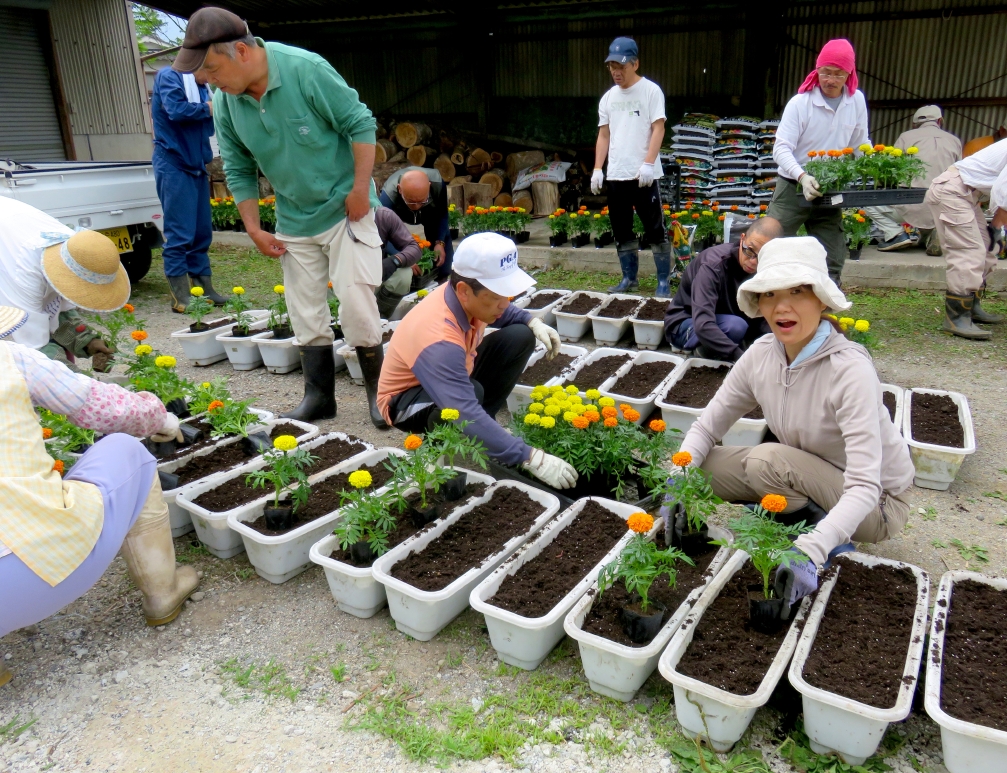
Today’s work was fairly easy. Other times I’ve been up to my ankles in snake-infested, muddy water, or clearing thick brush which intrudes on the rice and soybean fields if left unchecked. But it’s always good exercise and overall a pleasant experience.
People here ask me if I did this sort of thing in America. That’s easy to answer. Never!
I think back on life in the U.S. spanning many decades and the lack of much community spirit, the obsession with privacy, and what would appear to be a pathological devotion to avoiding personal contact with all but the most familiar in one’s personal circles. There is a paranoia, a distrust, a suspicion that overshadows normal, natural social proclivities.
How sad!
People like to blame it on modernity, technology, industrialization, the new economy.
But Japan is about as modern and technologically advanced as any country in the world. People are consumers par excellence here. The shopping malls are always packed! Japan has unfortunately embraced the Western economic model as well. Certainly it’s not casino capitalism, but definitely a tamer version of it — look at its frightening debt to GDP ratio!
Despite that, they have kept alive some traditions which promote sense of community, and the shared responsibility of living in that community. They create opportunities to work together for the common good, get to know one another, and just enjoy other folks who happen to live in the same geographical setting. Like our clean up days!
What a powerful and rewarding ritual this is!
Another reason for me to say . . .
I love Japan!
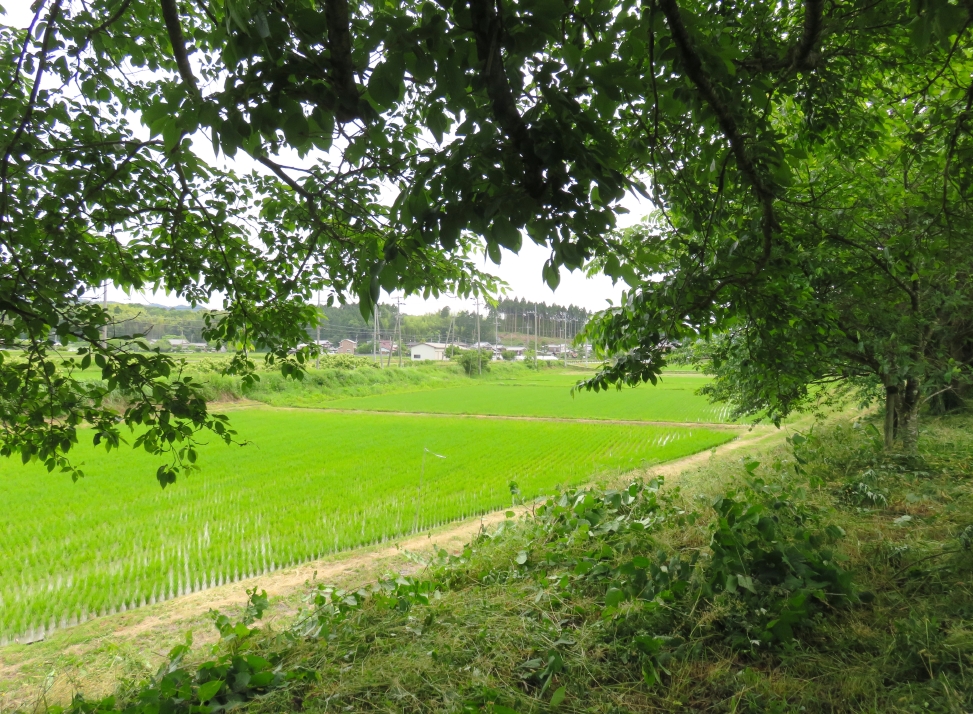




Life In Japan: I Love Japan Redux
I can tell you what I was doing. I was enjoying what I consider to be one of the most charming aspects of living where I do in Japan.
Sasayama is a tiny, traditional, rural city that sprawls over a large area, having absorbed five other towns into it many years ago. There are about 50,000 people living within the city limits.
But Sasayama is split into a number of small villages. Ours is called Noma. Each village has its own shrine — ours honors Benten, the goddess of arts, literature, music, and dance, quite appropriate for my wife and I — its own community center — exactly what it sounds like, a center for holding a variety of community meetings, get-togethers, barbecues, and so on — its own sports team for the annual sports day competitions with other villages — a funny and endearing event which deserves its own separate article.
During good weather, meaning only excepting the brutal winter months, the village gets together once or twice a month to . . . are you ready? . . . clean up the neighborhood!
Actually, since folks here rarely litter, going around to pick up gum wrappers and empty soda cans is kind of a pointless task. So usually we do other much more useful things, like tend to the vast system of irrigation ditches and channels, cut weeds, clear excess bamboo and other unwanted wild growth.
Today’s job was working on a wall which always sprouts all sorts of destructive weeds and shrubs. While men with weed-whackers cleared the undergrowth from the surrounding area, the rest of us hacked away at what was growing on the wall. Note that we don’t take the easy way out — using carcinogenic Roundup — but just do it by hand. Chop chop!
Our work sessions last from 3 to 4 hours. After nearly two hours, we take a short break. The village provides rolls and tea, and we just lounge about and talk, resting up for the final assault on the day’s project.
After cleaning up the wall, everyone returned to the community center, potted flowers for beautifying the neighborhood — they are placed all along the major paths and lanes which wind through our village — and were given flowers and potting soil to take home for our own personal use.
Today’s work was fairly easy. Other times I’ve been up to my ankles in snake-infested, muddy water, or clearing thick brush which intrudes on the rice and soybean fields if left unchecked. But it’s always good exercise and overall a pleasant experience.
People here ask me if I did this sort of thing in America. That’s easy to answer. Never!
I think back on life in the U.S. spanning many decades and the lack of much community spirit, the obsession with privacy, and what would appear to be a pathological devotion to avoiding personal contact with all but the most familiar in one’s personal circles. There is a paranoia, a distrust, a suspicion that overshadows normal, natural social proclivities.
How sad!
People like to blame it on modernity, technology, industrialization, the new economy.
But Japan is about as modern and technologically advanced as any country in the world. People are consumers par excellence here. The shopping malls are always packed! Japan has unfortunately embraced the Western economic model as well. Certainly it’s not casino capitalism, but definitely a tamer version of it — look at its frightening debt to GDP ratio!
Despite that, they have kept alive some traditions which promote sense of community, and the shared responsibility of living in that community. They create opportunities to work together for the common good, get to know one another, and just enjoy other folks who happen to live in the same geographical setting. Like our clean up days!
What a powerful and rewarding ritual this is!
Another reason for me to say . . .
I love Japan!